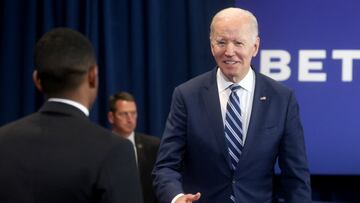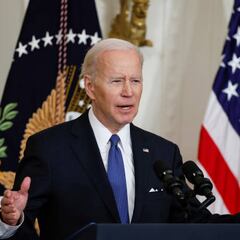What is the Biden administration’s proposal for student loan forgiveness like?
Plans are afoot before the midterms to offer something for young voters but the president has been cautious to exercise his nuclear option: debt forgiveness.


One of the major promises made in President Joe Biden’s election campaign was the landmark decision to cancel student debt. Over a year into the presidency, and nothing has happened of the sort. It is proving to be a major stumbling block for the Democrats as they approach the midterm elections in November. After cancelling much of the pandemic-era social spending plans, voters are not inspired to vote for the Democrats and a large-scale defeat is extended.
For young people, 2022 has been a year of high inflation, exacerbated by a predatory student debt system which forces many at the very minimum to put their lives on hold for years to pay it off. Social spending has been cut while significant investment has been made into weapons and production of fossil fuels, two issues that American youth are largely not in support of. Biden needs to do something to generate some enthusiasm in the youth for the elections, and cancelling of student debt would go a long way.
It is time to cancel all student debt. pic.twitter.com/hdrEGEIaGi
— Bernie Sanders (@BernieSanders) April 16, 2022
For some context and scale, the average student loan debt per borrower is $39,351, which means an average monthly payment of $393, according to recent statistics from EducationData.org. In total 43.2 million people currently have a student loan and that number is only increasing each year. Worryingly, around 2.6 million graduates owe more than $100,000 in student loan debt alone.
So what has the Biden administration done so far, and what are their plans in regard for student debt before election day?
Extension of payment moratorium
Back in March 2020 Congress passed the CARES Act, legislation designed to offer short-term financial relief in the face of the mounting scale of the covid-19 pandemic. This bill was responsible for the initial pause on the vast majority of student loan repayments (those related to federally-held student loans).
Related stories:
The moratorium not only halted the repayments, but prevented an interest being accrued and banned any collection efforts against borrowers who already owed back-payments for outstanding student loans. This has been further extended until August 31 2022, but after this date students will have to continue paying their debt unless a further extension is granted.
Recent changes to repayment
An announcement on Tuesday saw the first moves by President Joe Biden to tackle the crippling studrnt debt in the US. These plans included a revision of income-riven payments to make it easier for students to qualify for measure in which their loans could be automatically cancelled after 20 or 25 years.
But this is not expected to be a perfect fix for the issue. While 3.6 million people will have their path to debt forgiveness laid out, and another 40,000 wiped out immediately, there remains tens of millions of more students that are in serious debt trouble.
Can Biden wipe out student debt with one pen stroke?
Biden does have the opportunity to wipe all student debt using an executive order. So far, however, he has been unwilling to use it, nor discuss it publicly while members of his party support it.
Student debt cancellation is racial justice.
— Pramila Jayapal (@PramilaJayapal) April 16, 2022
Student debt cancellation is gender justice.
Student debt cancellation is economic justice.
Related stories
“With the flick of a pen, President Biden could cancel $50,000 in student loan debt and provide millions upon millions of student loan borrowers a new lease on life,” Senate Majority Leader Schumer said in October.
The debate is whether Biden truly has this power, and an executive forgiveness would likely be challenged in the Supreme Court. He is unlikely to win anything there for the rest of his presidency, as the conservative majority is likely to strike down anything brought there in his favour. But this is all hypothetical; until Biden tests his own powers as president, nothing will change in regard to student debt. For young Americans, this unwillingness to act for fear of defeat is no reprieve from the bills they have to face.

